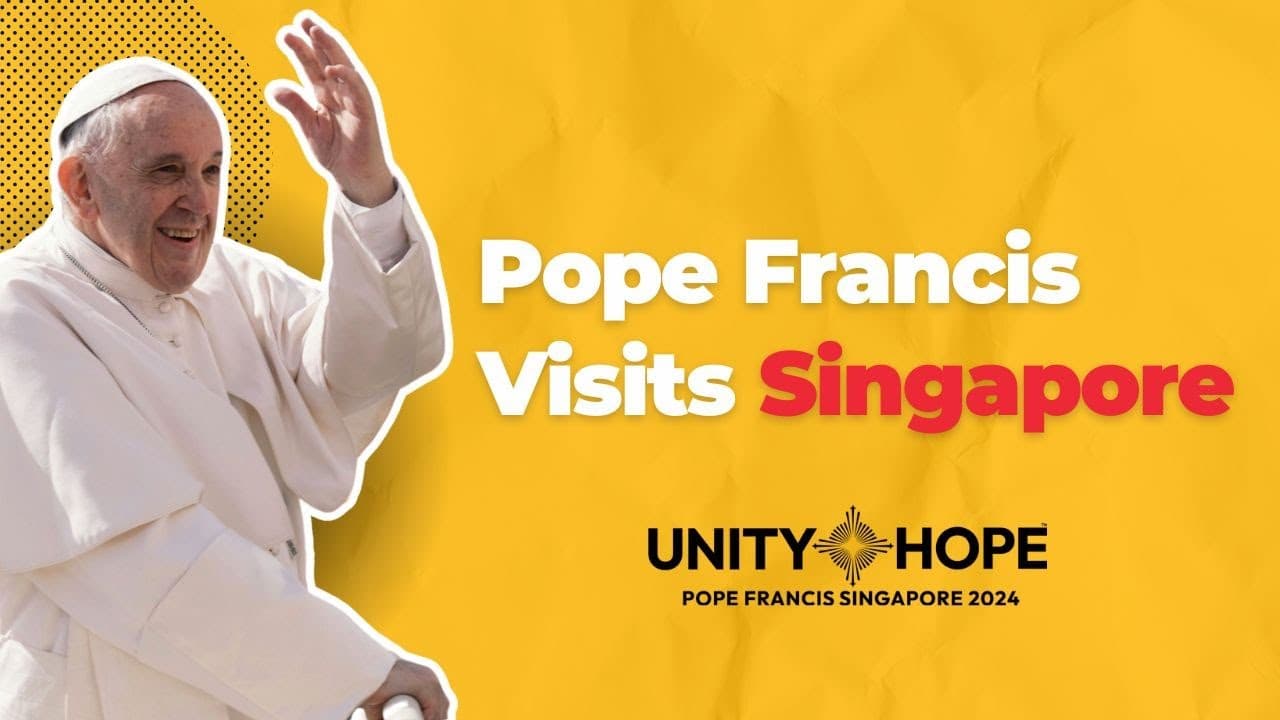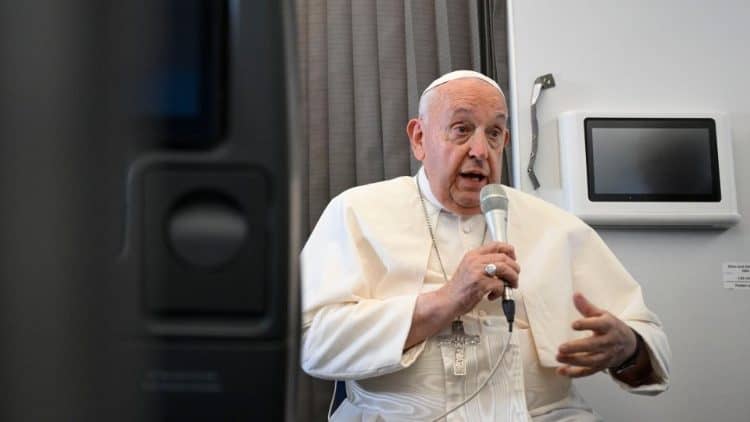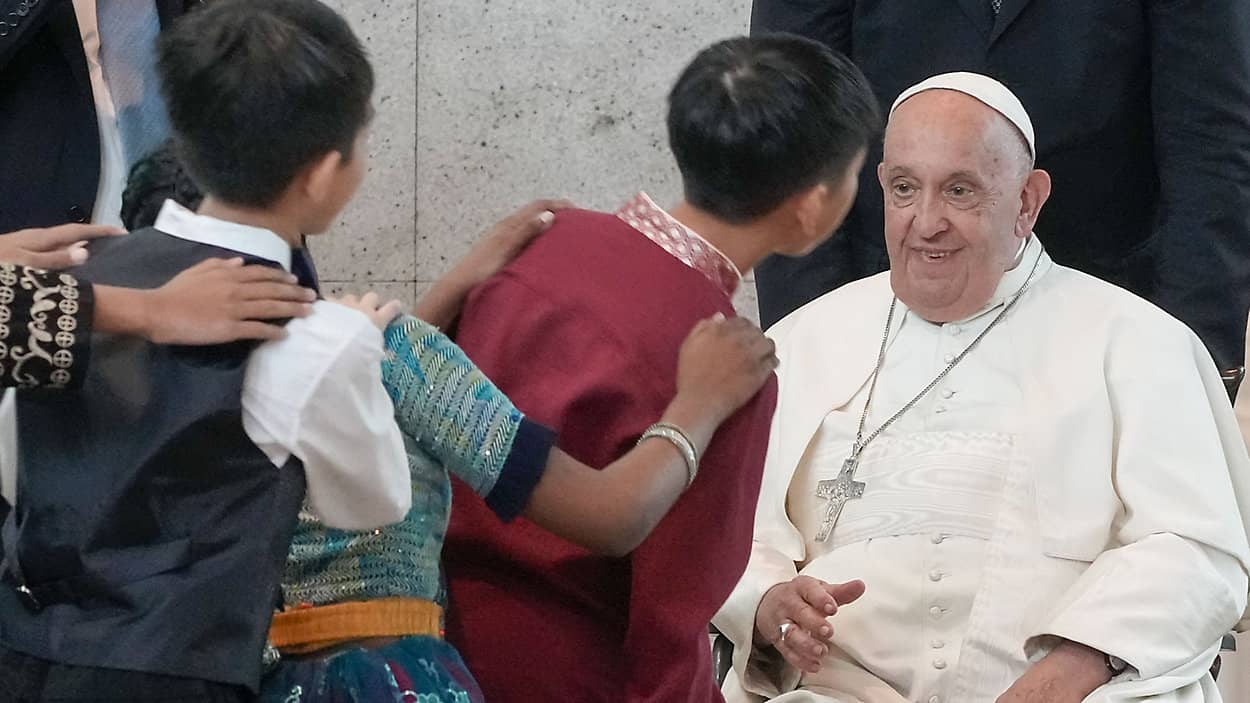SINGAPORE – Pope Francis landed in Singapore Wednesday, marking the final stage of his 12-day odyssey to Asia and Oceania, where he is expected to address various social issues and potentially make yet another gesture of goodwill to China.
Upon his arrival Sept. 11, the pope received an official welcome and took the remainder of the day to rest, with the only event on his schedule being a private meeting with Jesuits serving in the country.
While in Singapore from Sept. 11-13, Francis is scheduled to meet the President and Prime Minister of Singapore, Tharman Shanmugaratnam and Lawrence Wong, before giving an address to civil authorities and members of the diplomatic corps on Thursday.
He will wrap his second day in Singapore by celebrating a public Mass at the city-state’s SportsHub National Stadium.
Singapore is a largely agnostic nation, with around 20 percent of the population adhering to no specific religion.
Around 31 percent of the population of 6.2 million identified as Buddhist, and 18.9 percent as Christian, with around 6.7 percent – numbering 395,000 people – belonging to the Catholic Church, which has just one diocese.
The rest of the population is divided mostly between Muslims, who make up around 15.6 percent of the population, Taoists, who constitute 8.8 percent, and Hindus, who represent around five percent.
Pope Francis will close his visit Friday by meeting with a group of elderly and sick people assisted by Saint Theresa’s Home and holding an interreligious meeting with youth before returning to Rome.
The topic of finance and the global market will likely be front and center, as Singapore is consistently ranked among the strongest global economies, with businessmen such as George Yao having previously advised the Holy See on matters of finance.
Cardinal William Goh of Singapore told Crux in an interview that issues such as inclusiveness, human dignity, interreligious dialogue, the need to manage use of artificial intelligence and to care for the environment are topics that will likely come up during the papal visit, and that Pope Francis is seen as being close “to the lived realities of people,” and their struggles and pains.
RELATED: Papal trip will offer Singaporeans a message of hope, cardinal says
Goh said that papal events are already booked beyond capacity, and that members of other religious traditions have also shown interest in being present for the pope’s various appointments.
Francis is also expected, he said, to address Asia’s rich history and diversity, and the need to foster unity and collaboration amid differing political systems and ideologies.
In this regard, at the regional level Pope Francis is also expected to address China, as Singapore and China enjoy strong bilateral relations and Singapore is seen as a potential mediator with China in terms of dialogue on key issues such as the ongoing wars in Ukraine and Gaza.
Around 75 percent of Singaporeans are ethnically Chinese, and while some, including Jesuit Father Francis Lim, regional superior of Jesuits of Malaysia and Singapore, have said that by now Singaporeans are “a long way from our Chinese roots,” the topic of China is nonetheless expected to come up at some level.
RELATED: Pope’s odyssey in Asia and Oceania a story of both peripheries and politics
Vatican spokesman Matteo Bruni told journalists ahead of the pope’s visit that the pope is not expected to fly over Chinese or Taiwanese airspace on his way to and from Singapore, and he is unsure whether any bishops or faithful from China will attend papal events.
However, he did say that a delegation from Hong Kong is expected to attend the pope’s Mass on Thursday.
The China issue is of keen interest to observers, as the Vatican in October is expected to renew a 2018 agreement on episcopal appointments in China for the third time.
Pope Francis has gone to great lengths to engage China in recent years, offering a special greeting to the “noble Chinese people” during his final Mass in Mongolia last September, which was attended by various groups of Chinese Catholics – many of whom refused to speak with international media for fear of backlash, as they had been forbidden from attending papal events in Ulaanbaatar.
Two Chinese bishops also attended the first portion of last year’s October month-long session of the pope’s Synod of Bishops on Synodality, and this year the Vatican has announced a slew of bishop appointments in China – more than in every previous year combined since the 2018 agreement was struck.
Francis’s special peace envoy to Ukraine, Italian Cardinal Matteo Zuppi of Bologna, president of the Italian Bishops’ Conference, last summer visited Beijing in an attempt to promote humanitarian and peace efforts amid the war in Ukraine.
To what extent Pope Francis will engage the China issue is yet to be seen, but Singapore marks yet another opportunity for the pontiff to make a step forward in his ongoing courtship of both Chinese authorities and the Chinese people.
Follow Elise Ann Allen on X: @eliseannallen















